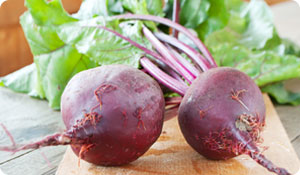
By now, you probably know which foods you should avoid sugary colas, greasy snacks, fatty fast foods. But what about the many nutritious foods nature has to offer? While many people are familiar with the well-publicized superfoods, such as berries, salmon, and spinach, there's an abundance of lesser-known treats that can also do wonders for your health. The next time you're at the supermarket, be sure to add these health-enhancing treats to your cart.
Beets: This crimson veggie is one of nature's best sources of folate and betaine. When combined, these nutrients lower your blood levels of homocysteine, an inflammatory compound that can damage arteries and increase your heart-disease risk. A recent study conducted by the London School of Medicine found that drinking just 500ml of beetroot juice a day can reduce blood pressure, and the natural pigments that give beets their color, called betacyanins, are proven cancer fighters in laboratory mice.
Cabbage: One cup of this super veggie packs just 22 calories, but don't let that fool you. Cabbage is loaded with valuable nutrients such as sulforaphane, a chemical that increases your body's production of the enzymes that disarm cell-damaging free radicals and reduces your risk of cancer. According to a recent study by Stanford University scientists, sulforaphane boosts your levels of these cancer-fighting enzymes more than any other plant chemical.
Guava: This obscure tropical fruit has almost 9 grams of fiber in every cup and a higher concentration of the prostate cancer fighting antioxidant lycopene than any other plant food. In addition, just one cup of its subtly sweet flesh provides 688 milligrams (mg) of potassium. That's 63 percent more than you'll find in a medium banana.
Purslane: Although the FDA classifies it as a broad-leaved weed, purslane is actually considered a vegetable and herb in many other countries. According to researchers at the University of Texas at San Antonio, purslane has the highest amount of heart-healthy omega-3 fats of any edible plant. In addition, this herb has 10 to 20 times more melatonin, an antioxidant shown to inhibit cancer growth, than any other fruit or vegetable tested.
Swiss Chard: One half-cup serving of cooked Swiss chard provides 10 mg each of lutein and zeaxanthin. According to Harvard researchers, these plant chemicals, known as carotenoids, protect the retina from age-related damage. Both nutrients, which are actually pigments, appear to accumulate in the retina, where they absorb the type of shortwave light rays that can damage eyes. So, the more Swiss chard you eat, the better your internal eye protection will be.





